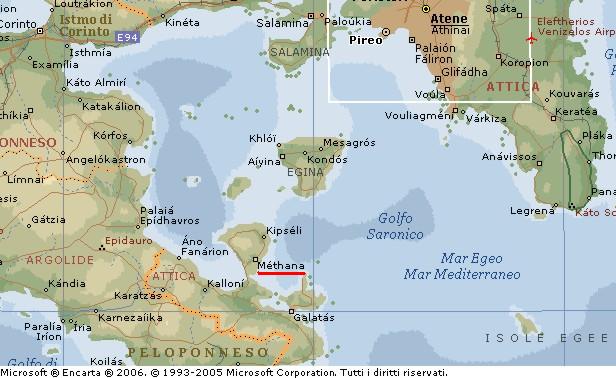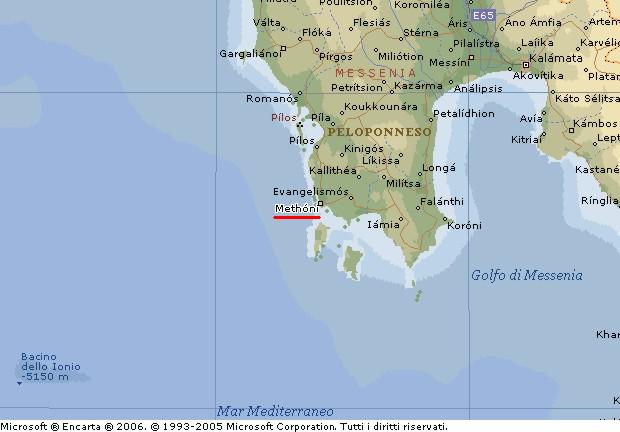Lessico
Methana - Méthana
Piccolo centro del Peloponneso orientale, nella regione storica dell’Argolide, posto su una penisoletta che si affaccia sul Golfo di Saronico, o Golfo di Egina, ma fagocitata dal dal nomós dell’Attica, il cui capoluogo č Atene. Circa 50 km di mare separano in linea d’aria Atene da Methana.

Possiamo
attingere le notizie storiche su Methana da Pausania il Periegeta![]() che ne parla nella sua Periegesi della Grecia II, Corinto,
34,1-6: [1]
Stretching out far into the sea from Troezenia is a peninsula, on the coast of
which has been founded a little town called Methana. Here
there is a sanctuary of Isis, and on the market-place is an image of Hermes,
and also one of Heracles. Some thirty stades distant from the town are hot
baths. They say that it was when Antigonus, son of Demetrius, was king of
Macedon that the water first appeared, and that what appeared at once was not
water, but fire that gushed in great volume from the ground, and when this
died down the water flowed; indeed, even at the present day it wells up hot
and exceedingly salt. A bather here finds no cold water at hand, and if he
dives into the sea his swim is full of danger. For wild creatures live in it,
and it swarms with sharks. [2] I will also relate what astonished me most in
Methana. The wind called Lips, striking the budding vines from the Saronic
Gulf, blights their buds. So while the wind is still rushing on, two men cut
in two a cock whose feathers are all white, and run round the vines in
opposite directions, each carrying half of the cock. When they meet at their
starting place, they bury the pieces there. [3] Such are the means they have
devised against the Lips. The islets, nine in number, lying off the land are
called the Isles of Pelops, and they say that when it rains one of them is not
touched. If this be the case I do not know, though the people around Methana
said that it was true, and I have seen before now men trying to keep off hail
by sacrifices and spells. [4] Methana, then, is a peninsula of the
Peloponnesus. Within it, bordering on the land of Troezen, is Hermione. The
founder of the old city, the Hermionians say, was Hermion, the son of Europs.
Now Europs, whose father was certainly Phoroneus, Herophanes of Troezen said
was an illegitimate child. For surely the kingdom of Argos would never have
devolved upon Argus, Niobe's son, the grandchild of Phoroneus, in the presence
of a legitimate son. [5] But even supposing that Europs was a legitimate child
who died before Phoroneus, I am quite sure that his son was not likely to
stand a fair chance against Niobe's child, whose father was supposed to be
Zeus. Subsequently the Dorians from Argos settled, among other places, at
Hermion, but I do not think there was war between the two peoples, or it would
have been spoken of by the Argives. [6] There is a road from Troezen to
Hermion by way of the rock which aforetime was called the altar of Zeus
Sthenius (Strong) but afterwards Theseus took up the tokens, and people now
call it the Rock of Theseus. As you go, then, along a mountain road by way of
this rock, you reach a temple of Apollo surnamed Platanistius (God of the
Plane-tree Grove), and a place called Eilei, where are sanctuaries of Demeter
and of her daughter Core (Maid). Seawards, on the borders of Hermionis, is a
sanctuary of Demeter surnamed Thermasia (Warmth). (Description of
Greece with an English Translation by W.H.S. Jones, Litt.D. in 4 Volumes.
Volume 1. Attica and Corinth, Cambridge, MA, Harvard University Press; London,
William Heinemann Ltd., 1918)
che ne parla nella sua Periegesi della Grecia II, Corinto,
34,1-6: [1]
Stretching out far into the sea from Troezenia is a peninsula, on the coast of
which has been founded a little town called Methana. Here
there is a sanctuary of Isis, and on the market-place is an image of Hermes,
and also one of Heracles. Some thirty stades distant from the town are hot
baths. They say that it was when Antigonus, son of Demetrius, was king of
Macedon that the water first appeared, and that what appeared at once was not
water, but fire that gushed in great volume from the ground, and when this
died down the water flowed; indeed, even at the present day it wells up hot
and exceedingly salt. A bather here finds no cold water at hand, and if he
dives into the sea his swim is full of danger. For wild creatures live in it,
and it swarms with sharks. [2] I will also relate what astonished me most in
Methana. The wind called Lips, striking the budding vines from the Saronic
Gulf, blights their buds. So while the wind is still rushing on, two men cut
in two a cock whose feathers are all white, and run round the vines in
opposite directions, each carrying half of the cock. When they meet at their
starting place, they bury the pieces there. [3] Such are the means they have
devised against the Lips. The islets, nine in number, lying off the land are
called the Isles of Pelops, and they say that when it rains one of them is not
touched. If this be the case I do not know, though the people around Methana
said that it was true, and I have seen before now men trying to keep off hail
by sacrifices and spells. [4] Methana, then, is a peninsula of the
Peloponnesus. Within it, bordering on the land of Troezen, is Hermione. The
founder of the old city, the Hermionians say, was Hermion, the son of Europs.
Now Europs, whose father was certainly Phoroneus, Herophanes of Troezen said
was an illegitimate child. For surely the kingdom of Argos would never have
devolved upon Argus, Niobe's son, the grandchild of Phoroneus, in the presence
of a legitimate son. [5] But even supposing that Europs was a legitimate child
who died before Phoroneus, I am quite sure that his son was not likely to
stand a fair chance against Niobe's child, whose father was supposed to be
Zeus. Subsequently the Dorians from Argos settled, among other places, at
Hermion, but I do not think there was war between the two peoples, or it would
have been spoken of by the Argives. [6] There is a road from Troezen to
Hermion by way of the rock which aforetime was called the altar of Zeus
Sthenius (Strong) but afterwards Theseus took up the tokens, and people now
call it the Rock of Theseus. As you go, then, along a mountain road by way of
this rock, you reach a temple of Apollo surnamed Platanistius (God of the
Plane-tree Grove), and a place called Eilei, where are sanctuaries of Demeter
and of her daughter Core (Maid). Seawards, on the borders of Hermionis, is a
sanctuary of Demeter surnamed Thermasia (Warmth). (Description of
Greece with an English Translation by W.H.S. Jones, Litt.D. in 4 Volumes.
Volume 1. Attica and Corinth, Cambridge, MA, Harvard University Press; London,
William Heinemann Ltd., 1918)
Metone
Non bisogna confondere Methana con Metone, un errore non insignificante nel quale ci induce non solo Aldrovandi, ma anche il vocabolario di greco di Lorenzo Rocci.
Aldrovandi - contrariamente a Gessner e forse grazie alla tipografia Bellagamba di Bologna - riporta Methonae urbis invece di Methanae urbis nel II volume della sua Ornitologia stampato da Bellagamba (1600).
Lorenzo Rocci riporta che Methánë e Méthana sono equivalenti a Methřnë. Questo č un grave errore.

Oggi come in passato Metone si trova in Messenia, e
ancora come in passato si scrive Methřnë anche se in greco
moderno viene traslitterata in Methóni. Si tratta di un centro di 2500
abitanti che guarda verso l’Italia, situato nella Grecia meridionale, nel nomós
di Messenia appartenente al Peloponneso, 40 km a SW del capoluogo Kalámata,
sul Mar Ionio. Fondata dai Calcidesi d'Eubea nella seconda metŕ del sec. VIII
aC, dopo le guerre persiane si alleň con Atene ed entrň nella Lega
Delio-Attica. Ad Atene rimase fedele anche contro Filippo di Macedonia![]() che la prese ed espugnň dopo un lungo assedio nel 354 aC.
che la prese ed espugnň dopo un lungo assedio nel 354 aC.